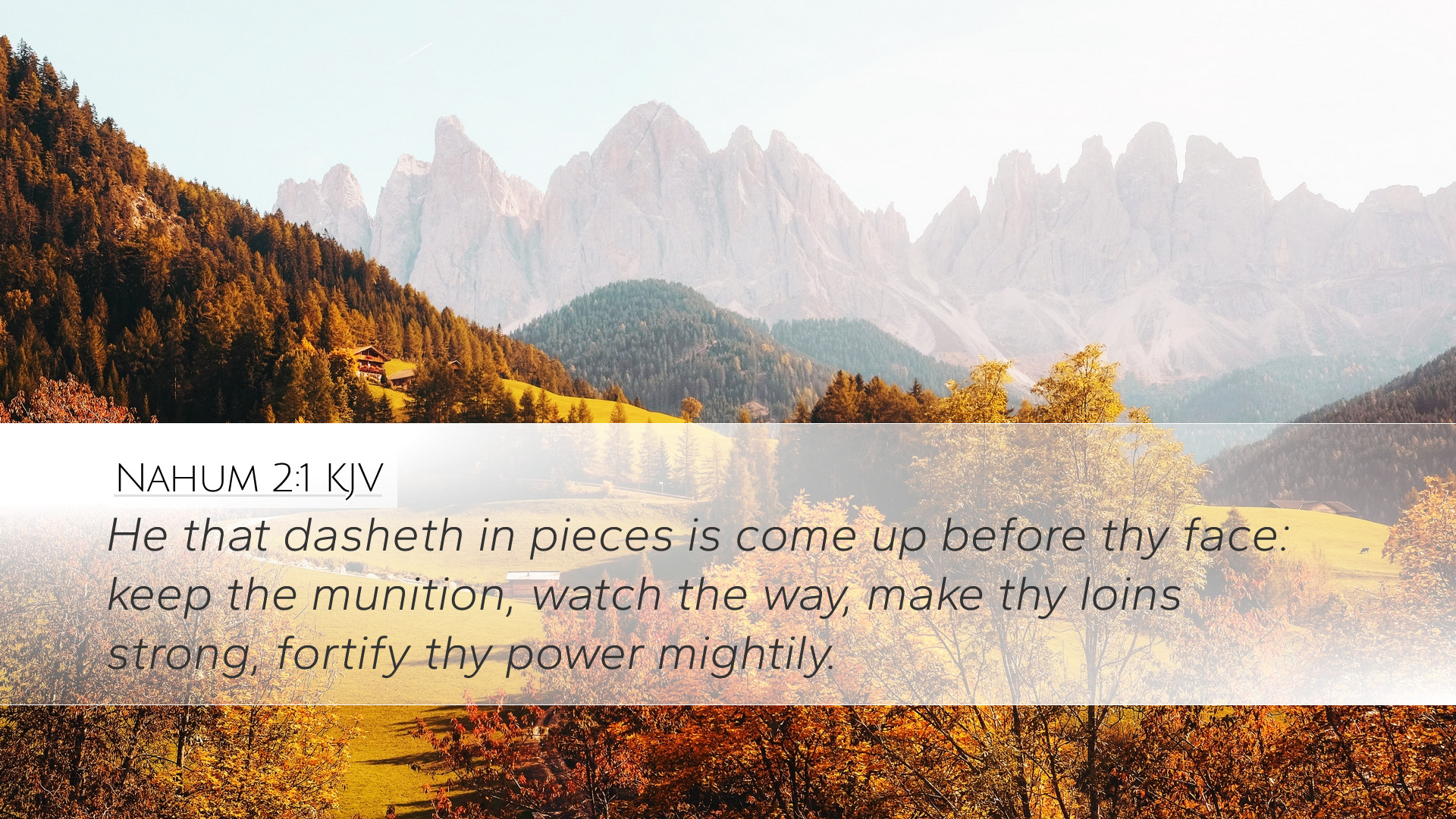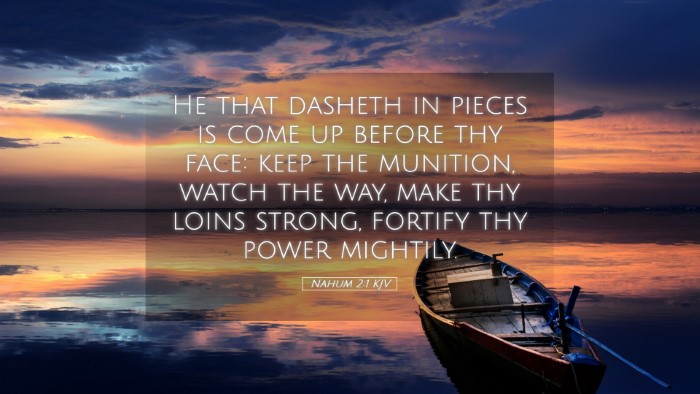Old Testament
Genesis Exodus Leviticus Numbers Deuteronomy Joshua Judges Ruth 1 Samuel 2 Samuel 1 Kings 2 Kings 1 Chronicles 2 Chronicles Ezra Nehemiah Esther Job Psalms Proverbs Ecclesiastes Song of Solomon Isaiah Jeremiah Lamentations Ezekiel Daniel Hosea Joel Amos Obadiah Jonah Micah Nahum Habakkuk Zephaniah Haggai Zechariah MalachiNahum 2:1
Nahum 2:1 KJV
He that dasheth in pieces is come up before thy face: keep the munition, watch the way, make thy loins strong, fortify thy power mightily.
Nahum 2:1 Bible Commentary
Nahum 2:1 - A Commentary
Nahum 2:1 presents a profound moment in the prophetic writings, where the prophet Nahum delivers a message of impending judgment upon Nineveh, the capital of Assyria. This verse encapsulates the themes of divine retribution and redemption for the people of God.
Text of Nahum 2:1
"He that dasheth in pieces is come up before thy face: keep the munition, watch the way, make thy loins strong, fortify thy power mightily."
Contextual Overview
Nahum's prophecy is set against the backdrop of Assyria's brutal dominance and the suffering inflicted on God's people. The Assyrians were known for their military prowess and cruelty, making Nahum's message both timely and relevant.
This chapter speaks directly to the devastation that would befall Nineveh, proclaiming hope for Israel while pronouncing doom on those who oppressed them. Understanding this context is critical for interpreting the urgency and tone of prophetic warnings.
Interpretation and Analysis
1. The Assailant's Approach
The phrase "He that dasheth in pieces" denotes a fierce and terrible adversary approaching with intent to destroy. Matthew Henry emphasizes the ferocity of the enemy, suggesting that this imagery reflects the overwhelming might of the forces aligned against Nineveh.
2. A Call to Action
Nahum calls upon the inhabitants of Nineveh to prepare for the oncoming siege. “Keep the munition, watch the way” implies a necessity for vigilance and readiness. Albert Barnes notes that this signifies that the Assyrians must brace themselves for the consequences of their actions, reinforcing the inevitability of judgment.
3. Strengthening and Fortification
The advice to "make thy loins strong, fortify thy power mightily" is analogous to preparing for battle. Adam Clarke elaborates on this, arguing that such exhortations illustrate the futility of human strength when facing divine judgment. The people are encouraged to act, yet the outcome is predetermined by God's will.
Theological Insights
From this verse, several theological principles emerge that hold significance for pastors and theologians alike:
- The Sovereignty of God: The prophecy illustrates God's ultimate authority over nations. Despite human attempts to fortify against judgment, God's decree prevails.
- The Nature of Divine Judgment: The severity of God's judgment serves as a reminder of His holiness and justice. Nineveh's impending destruction is a demonstration of the consequences of sin.
- Hope for the Oppressed: For Israel, Nahum's message is one of hope, indicating that God does not forget the plight of His people, and justice will ultimately be served.
Applications for Today
The themes in Nahum 2:1 resonate with contemporary believers in multiple ways:
- Readiness in the Face of Adversity: Just as Nineveh was called to prepare, Christians today are called to be vigilant and endure faithfully, trusting in God's promises.
- Understanding Justice: Reflecting on the nature of God’s justice reassures believers that God sees injustice and will act. It encourages social responsibility and the pursuit of righteousness.
- Proclaiming Hope: Similar to Nahum, modern-day prophets and believers must proclaim hope amidst darkness, assuring others of God's eventual justice and restoration.
Conclusion
Nahum 2:1 serves as a powerful reminder of the dual aspects of God's nature: His justice and His mercy. As pastors, students, and theologians, it is crucial to grasp the multifaceted teachings found in this passage. In an age where injustice pervades, Nahum calls for both a solemn warning and a vibrant hope. The passage invites readers everywhere to recognize God's sovereignty, prepare their hearts for His coming, and maintain faith amidst trials.


